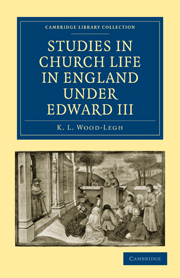Book contents
- Frontmatter
- General Preface
- Introduction
- Contents
- CHAPTER I Royal Administration of Religious Houses
- CHAPTER II Royal Visitations of Hospitals and Free Chapels
- CHAPTER III Alienations in Mortmain
- CHAPTER IV Chantries
- CHAPTER V Appropriation of Parish Churches
- CHAPTER VI Conclusion
- Appendix
- Bibliography
- Index
General Preface
Published online by Cambridge University Press: 07 September 2010
- Frontmatter
- General Preface
- Introduction
- Contents
- CHAPTER I Royal Administration of Religious Houses
- CHAPTER II Royal Visitations of Hospitals and Free Chapels
- CHAPTER III Alienations in Mortmain
- CHAPTER IV Chantries
- CHAPTER V Appropriation of Parish Churches
- CHAPTER VI Conclusion
- Appendix
- Bibliography
- Index
Summary
There is only too much truth in the frequent complaint that history, as compared with the physical sciences, is neglected by the modern public. But historians have the remedy in their own hands; choosing problems of equal importance to those of the scientist, and treating them with equal accuracy, they will command equal attention. Those who insist that the proportion of accurately ascertainable facts is smaller in history, and therefore the room for speculation wider, do not thereby establish any essential distinction between truth-seeking in history and truth-seeking in chemistry. The historian, whatever be his subject, is as definitely bound as the chemist “to proclaim certainties as certain, falsehoods as false, and uncertainties as dubious ”. Those are the words, not of a modern scientist, but of the seventeenth century monk, Jean Mabillon; they sum up his literary profession of faith. Men will follow us in history as implicitly as they follow the chemist, if only we will form the chemist's habit of marking clearly where our facts end and our inferences begin. Then the public, so far from discouraging our speculations, will most heartily encourage them; for the most positive man of science is always grateful to anyone who, by putting forward a working theory, stimulates further discussion.
The present series, therefore, appeals directly to that craving for clearer facts which has been bred in these times of storm and stress. No care can save us altogether from error; but for our own sake and the public's we have elected to adopt a safeguard dictated by ordinary business common-sense.
- Type
- Chapter
- Information
- Studies in Church Life in England under Edward III , pp. v - viPublisher: Cambridge University PressPrint publication year: 2010First published in: 1934

